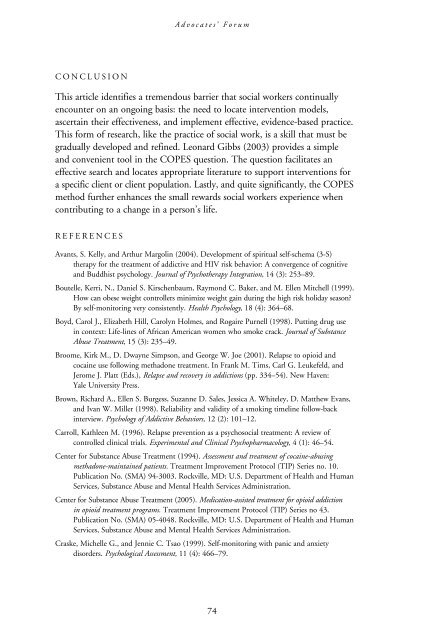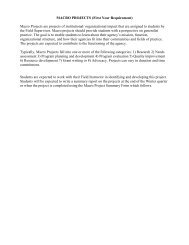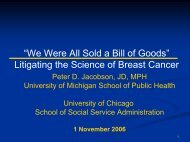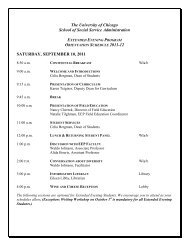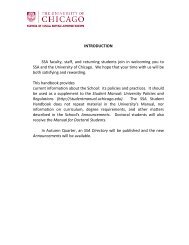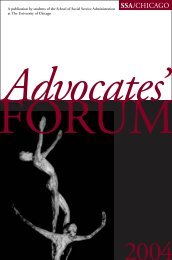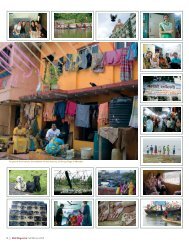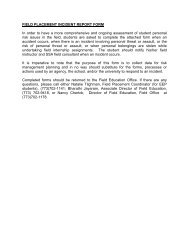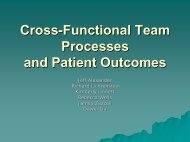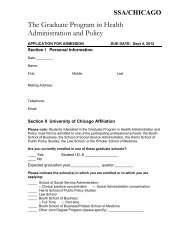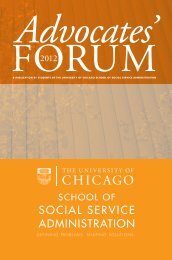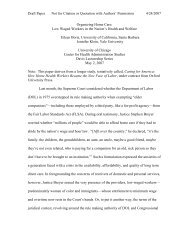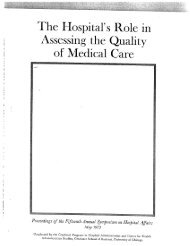2006 - School of Social Service Administration - University of Chicago
2006 - School of Social Service Administration - University of Chicago
2006 - School of Social Service Administration - University of Chicago
Create successful ePaper yourself
Turn your PDF publications into a flip-book with our unique Google optimized e-Paper software.
Advocates’ Forum<br />
CONCLUSION<br />
This article identifies a tremendous barrier that social workers continually<br />
encounter on an ongoing basis: the need to locate intervention models,<br />
ascertain their effectiveness, and implement effective, evidence-based practice.<br />
This form <strong>of</strong> research, like the practice <strong>of</strong> social work, is a skill that must be<br />
gradually developed and refined. Leonard Gibbs (2003) provides a simple<br />
and convenient tool in the COPES question. The question facilitates an<br />
effective search and locates appropriate literature to support interventions for<br />
a specific client or client population. Lastly, and quite significantly, the COPES<br />
method further enhances the small rewards social workers experience when<br />
contributing to a change in a person’s life.<br />
REFERENCES<br />
Avants, S. Kelly, and Arthur Margolin (2004). Development <strong>of</strong> spiritual self-schema (3-S)<br />
therapy for the treatment <strong>of</strong> addictive and HIV risk behavior: A convergence <strong>of</strong> cognitive<br />
and Buddhist psychology. Journal <strong>of</strong> Psychotherapy Integration, 14 (3): 253–89.<br />
Boutelle, Kerri, N., Daniel S. Kirschenbaum, Raymond C. Baker, and M. Ellen Mitchell (1999).<br />
How can obese weight controllers minimize weight gain during the high risk holiday season?<br />
By self-monitoring very consistently. Health Psychology, 18 (4): 364–68.<br />
Boyd, Carol J., Elizabeth Hill, Carolyn Holmes, and Rogaire Purnell (1998). Putting drug use<br />
in context: Life-lines <strong>of</strong> African American women who smoke crack. Journal <strong>of</strong> Substance<br />
Abuse Treatment, 15 (3): 235–49.<br />
Broome, Kirk M., D. Dwayne Simpson, and George W. Joe (2001). Relapse to opioid and<br />
cocaine use following methadone treatment. In Frank M. Tims, Carl G. Leukefeld, and<br />
Jerome J. Platt (Eds.), Relapse and recovery in addictions (pp. 334–54). New Haven:<br />
Yale <strong>University</strong> Press.<br />
Brown, Richard A., Ellen S. Burgess, Suzanne D. Sales, Jessica A. Whiteley, D. Matthew Evans,<br />
and Ivan W. Miller (1998). Reliability and validity <strong>of</strong> a smoking timeline follow-back<br />
interview. Psychology <strong>of</strong> Addictive Behaviors, 12 (2): 101–12.<br />
Carroll, Kathleen M. (1996). Relapse prevention as a psychosocial treatment: A review <strong>of</strong><br />
controlled clinical trials. Experimental and Clinical Psychopharmacology, 4 (1): 46–54.<br />
Center for Substance Abuse Treatment (1994). Assessment and treatment <strong>of</strong> cocaine-abusing<br />
methadone-maintained patients. Treatment Improvement Protocol (TIP) Series no. 10.<br />
Publication No. (SMA) 94-3003. Rockville, MD: U.S. Department <strong>of</strong> Health and Human<br />
<strong>Service</strong>s, Substance Abuse and Mental Health <strong>Service</strong>s <strong>Administration</strong>.<br />
Center for Substance Abuse Treatment (2005). Medication-assisted treatment for opioid addiction<br />
in opioid treatment programs. Treatment Improvement Protocol (TIP) Series no 43.<br />
Publication No. (SMA) 05-4048. Rockville, MD: U.S. Department <strong>of</strong> Health and Human<br />
<strong>Service</strong>s, Substance Abuse and Mental Health <strong>Service</strong>s <strong>Administration</strong>.<br />
Craske, Michelle G., and Jennie C. Tsao (1999). Self-monitoring with panic and anxiety<br />
disorders. Psychological Assessment, 11 (4): 466–79.<br />
74


